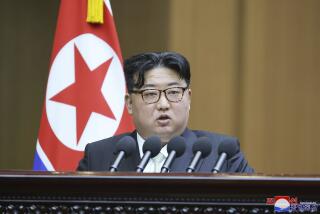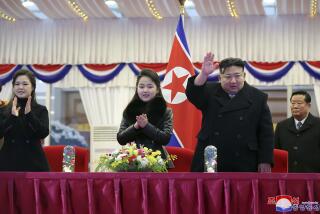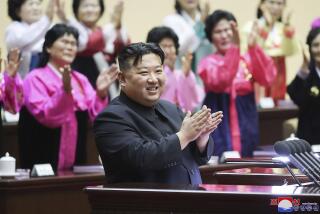North Korea to send ‘army of beauties’ cheering squad to Winter Olympics in South Korea
Regardless of which North Korean athletes end up competing in the Winter Olympics next month, their country is ready to bring an army of fans.
That’s because the North Korean government — master of the giant, choreographed celebration — negotiated the right to bring its state-sponsored cheering squad to the Games, set to begin Feb. 9 in Pyeongchang, South Korea. The arrangement was included in a recent deal between the Koreas that secured the isolated North’s presence at the Games.
The group of 230 women, dubbed an “army of beauties” by observers, is expected to bring a unique and practiced blend of chants, dances and songs.
“They will be the cover girls of the whole delegation,” said Suk-Young Kim, a critical studies professor at UCLA who has written books about Korean culture, most recently about pop music. “They will be the centerpiece of North Korea’s propaganda efforts.”
It will be the first time in 13 years that the cheering squad — which once included North Korean leader Kim Jong Un’s wife, Ri Sol Ju — will appear in South Korea.
The last time the group performed in the South, about 100 women attended the 2005 Asian Athletics Championships. They arrived at Incheon International Airport with unification flags, dressed in striking white and black choson-ot, a ceremonial flowing outfit in North Korea. (It’s known as a hanbok in South Korea.)
That squad, which included a then-single Ri, performed together dressed often in identical costumes and baseball caps — as they did during other international sporting events in the South, in 2002 and 2003.
Seeing the squad this year might generate positive feelings among South Koreans, old and young, about the possibilities of unifying the Korean peninsula — an elusive, long-term goal for both nations that was an undercurrent sparking the agreement to cooperate, analysts said.
The two nations, separated during World War II and the Korean War, which ended with an armistice in 1953, have lived divided and bracing for conflict. Tensions have heightened in the last year over the North’s illicit pursuit of a nuclear weapons program.
But the cheering squad’s synchronized routines over the years have captured the attention of many South Koreans, most likely the reason they’re in the North’s delegation. Its members — generally in their mid-20s or younger and at least 5 feet, 4 inches tall — are picked from art troupes or schools, such as Kim Il Sung University in Pyongyang. The squad features a brass band.
“It is highly unlikely that any North Korean athlete would win a medal, so propaganda value is much bigger than sports value,” said Ahn Chan-il, a defector who is now president of the World Institute for North Korea Studies. “What other country would send such cheerleaders to the Olympics but North Korea?”
The squad’s presence during this year’s Games was one of many terms agreed upon between North Korea and South Korea in recent weeks as they negotiated the North’s participation, its first in a Winter Olympics since 2010.

North Korea appears determined to use the Games to highlight its cultural and arts programs, in addition to sports, as plans also call for visits by a 30-member taekwondo demonstration group and a 140-person orchestra that is scheduled to give music performances in Seoul, the capital, and Gangneung, another city hosting Olympics events.
“The purpose of its cheering squad and art troupe is to attract attention and gain a foothold for the state’s entry to the world stage,” Ahn said.
Many details about the full delegation’s travel and accommodations are still being negotiated by the two countries. The size of the full delegation isn’t yet known, but it’s expected to include several hundred people. The cheering squad might arrive a few days before the Games begin.
The North and South will march together during the opening ceremony under the unification flag and will seek to field a combined women’s ice hockey team.
If approved by the International Olympic Committee, perhaps as early as Saturday in Switzerland, the team would be the first unified Olympic squad in Korean history.
The tense history between the two countries is also reflected in the makeup of the cheering squad, whose members are screened for loyalty and cannot have current relatives in South Korea, an effort to prevent defections.
“Members of the cheering squad must be from a good family,” Ahn said.
The cheering squad, which backed out of a planned appearance in Incheon three years ago during negotiations with the South over the cost and accommodations, this year will encounter a new generation of South Korean fans — young people raised amid a culture of pop-music saturation and celebrity beauty.
Analysts including Suk-Young Kim, the UCLA professor, said the squad has an opportunity to make a positive impression about the North on this generation in the South.
It doesn’t have the same memories of the Korean War or even the difficult years after the armistice, as South Korea ascended from poverty into the world’s 11th largest economy.
“There will be a response from young people,” said Kim, who also directs the university’s Center for Performance Studies. “This current generation of K-pop fans hasn’t seen this.”
Stiles is a special correspondent.
More to Read
Start your day right
Sign up for Essential California for news, features and recommendations from the L.A. Times and beyond in your inbox six days a week.
You may occasionally receive promotional content from the Los Angeles Times.







